Despite having LPG cylinders, rural women are back cooking on woodfired stoves
The gas cylinder that cost Rs 636 in June last year, is today priced at Rs 847. Several rural beneficiaries of the Ujjwala Yojana find it unaffordable and have been forced to revert to woodfire cooking, a health hazard.
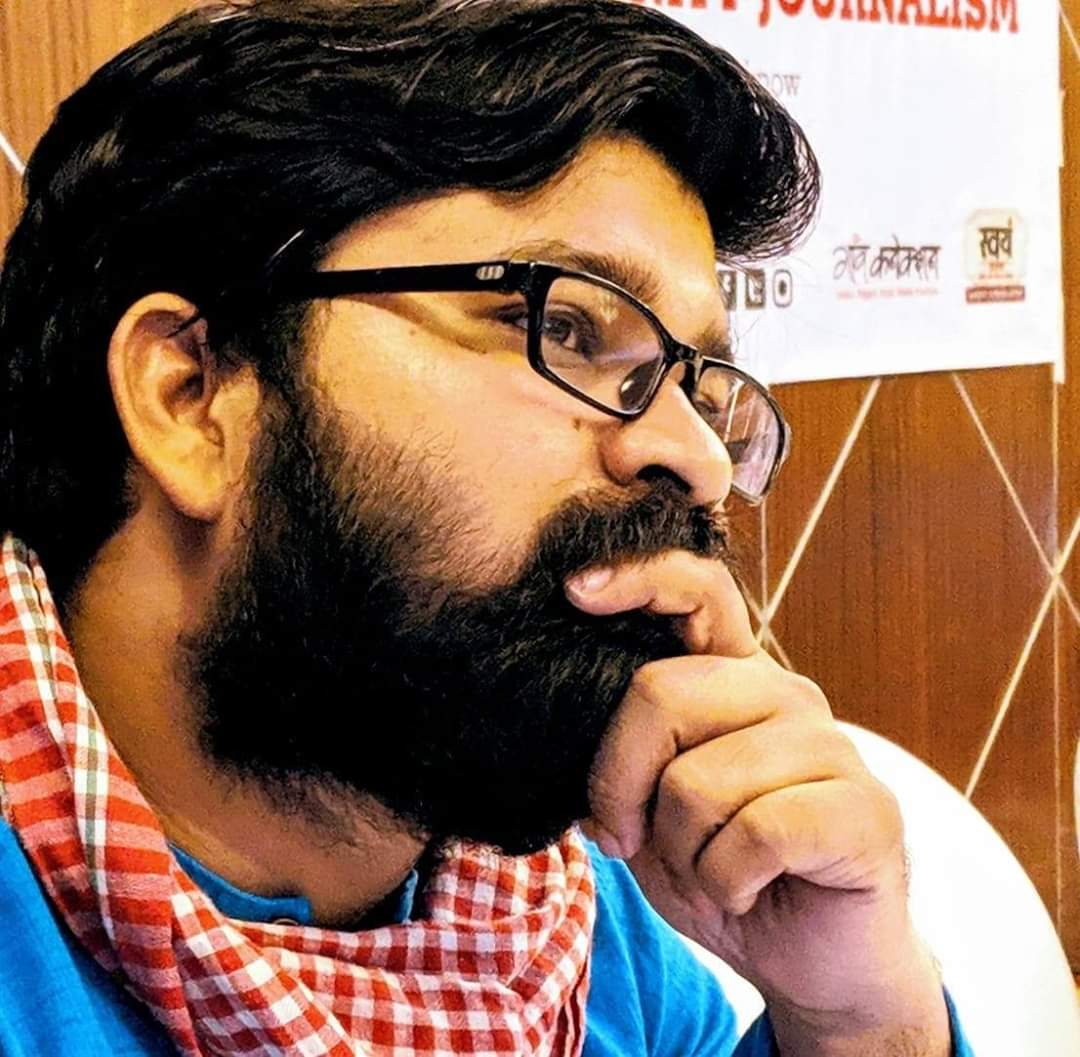
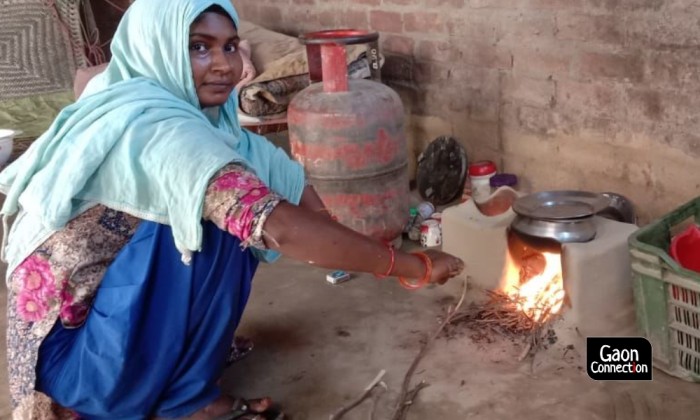
The rising price of the gas cylinder has put the brakes on the number of rural people actually using them. Photo: Virendra Singh
Five years ago, Chandrakali’s life transformed. Or so she thought when she received an LPG (liquified petroleum gas) connection under the Pradhan Mantri Ujjwala Yojana.
A resident of Kothra village in Satna, Madhya Pradesh, she thought she had seen the last of the hard work and drudgery — smoke burning her eyes and daily filling up her lungs — as she spent decades cooking over a firewood stove in her poorly ventilated kitchen.
Sadly, she is back to cooking with firewood and dung cakes on her earthen stove, as she cannot afford to refill her gas cylinder anymore.
“Earlier, I somehow managed five to six hundred rupees to refill the gas cylinder but now it costs as much as nine hundred rupees and I cannot afford it,” the 45-year-old, who earns no more than Rs 70 for rolling 1,000 beedis, told Gaon Connection.
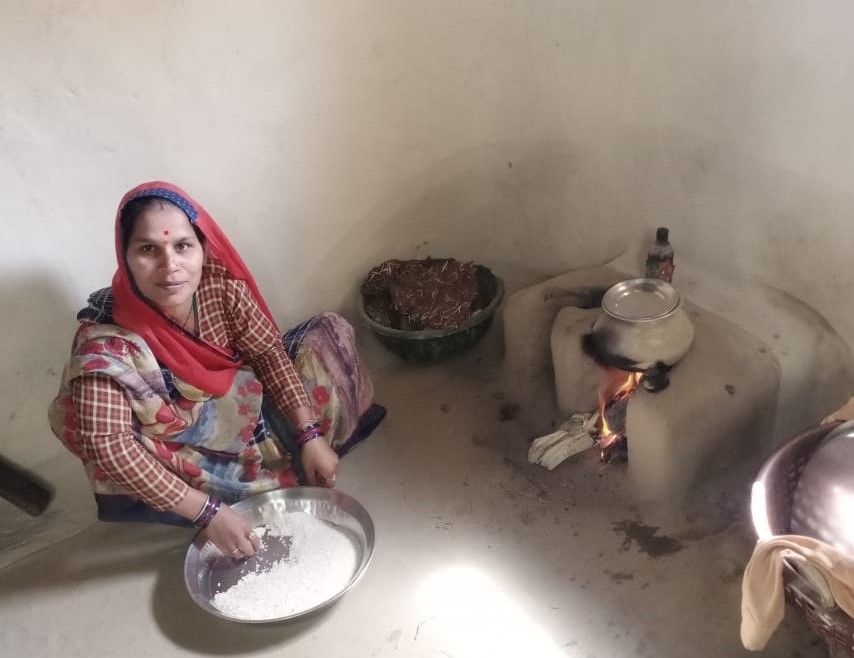
According to the central government’s records, 80 million Indians, including rural women like Chandrakali, are beneficiaries of the Pradhan Mantri Ujjwala Yojana launched in 2016. The scheme was to benefit women who cooked on woodfired stoves and protect them from inhaling toxic cooking smoke that could cause severe lung ailments.
Ujjwala Yojana claims that 95 per cent of the country’s population was able to secure LPG gas connections under this scheme. In order to make it 100 per cent, the Centre has announced a further one crore (10 million) connections to be provided under the scheme in the coming two years.
Also read: “Do we refill the cylinders or feed ourselves?”
However, existing beneficiaries like Chandrakali are going back to smoky kitchens stocked with firewood and dung cakes as they are unable to afford the rising cost of the gas cylinder.
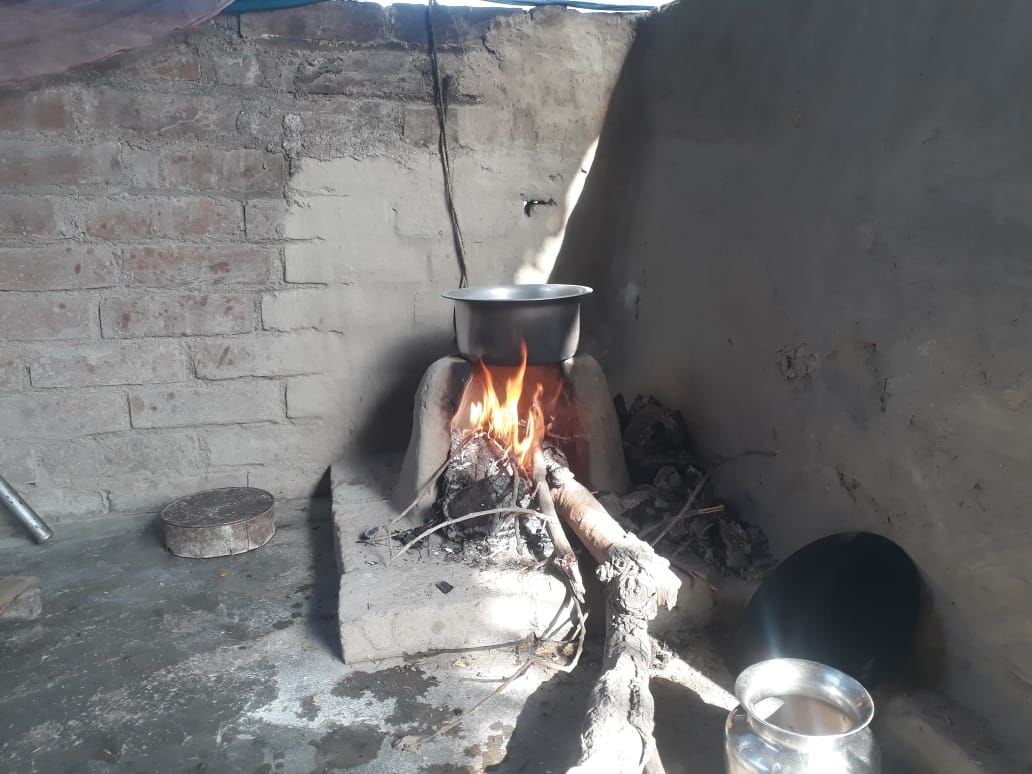
The price of the LPG cylinder has gone up several times already this year. It was increased by Rs 25 on February 4, then by Rs 50 on February 15; again increased by Rs 25 on February 25 and yet again hiked by Rs 25 on March 1.
The LPG cylinder that cost Rs 767 before February 4 went up to Rs 917.50. However, on April 1, there was a respite when the price of the LPG cylinder fell by Rs 10. Currently, the 14.2 kg domestic LPG cylinder costs Rs 847 in Lucknow, Uttar Pradesh. Last year, in June, it was priced at Rs 636.
Rural households going back using firewood and dung cakes is a major health concern. “Even today, women in rural India cook food on wood stoves in which they use wood and dung cakes. Smoke from it is the leading cause of COPD (chronic obstructive pulmonary disease). This is as harmful as smoke from the cigarettes,” stated Rajendra Prasad, former president of the National Chest Society, who is based in Lucknow.
According to a report by the World Health Organization, one of the leading causes of COPD deaths is biomass smoke that is emitted when wood, animal dung, crop residue, etc are burnt. A nearly three-fold increase in COPD was detected amongst women who cooked on woodfired stoves, especially in rural areas.
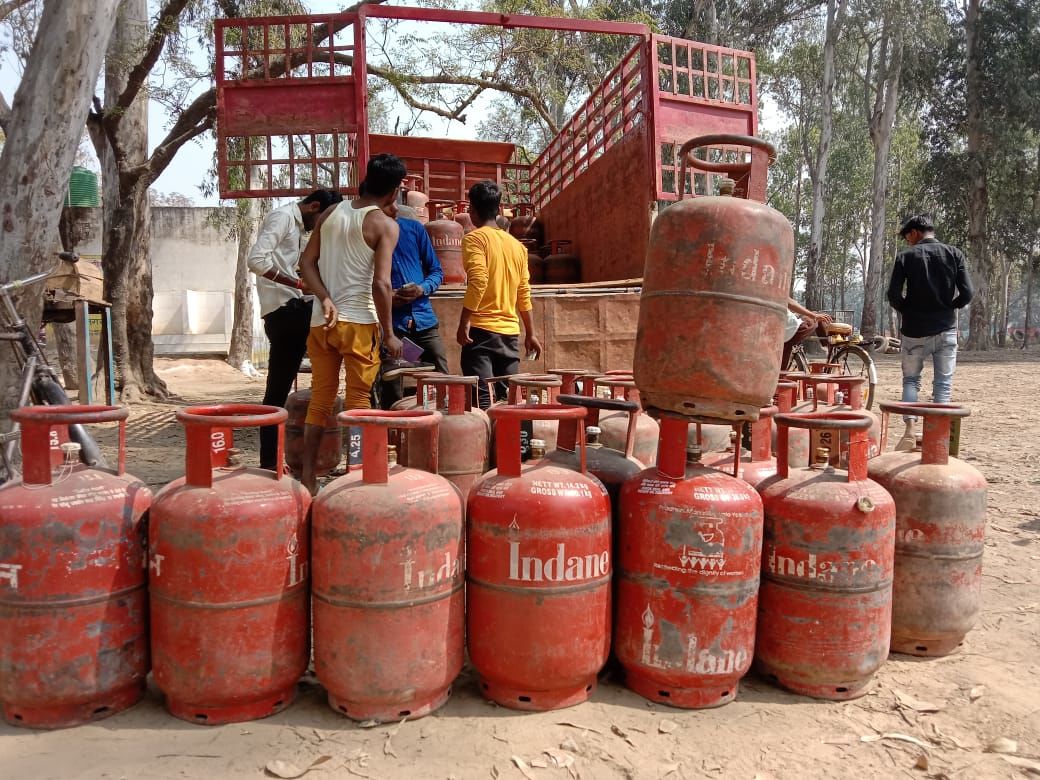
No money for refills
Not too far from Chandrakali’s Kothra village, Ramrati Chaudhary of Sagamaniya village has also not refilled her cylinder for nearly seven months now. “The rising price of the refill makes it impossible for me to do so. I now cook only on wood or dung cakes. After all, we used to cook like this earlier,” she shrugged.
The rising price of the gas cylinder has put the brakes on the number of rural people actually using them.
Carpet weaver, Kanchan Kumar, from Khamhariya in Bhadohi district of Uttar Pradesh, is already struggling with the COVID-19 pandemic hitting his work. Though his family also got a gas connection under the Ujjwala Yojana in 2018, he has not been able to refill the cylinder for the past five months.
“Both of my sons work outside. The carpet work is also doing poorly and on top of that, the price of gas is going up every month. It has become too high for me to afford a refill,” the 47-year-old told Gaon Connection.
“When we were provided the gas connection, a subsidy of up to three hundred rupees was also provided on the cylinders, but now even that has been done away with. No subsidy has reached our accounts for the last eight months. I even checked up with the agency several times where I was told that the money had already been sent,” Kumar complained.
While 30-year-old Lalita from Belhara town in Barabanki district of Uttar Pradesh managed to refill her cylinder a couple of times, she has stopped doing so now. She found it far cheaper to buy firewood and dung cakes than refill the cylinder, she pointed out.
Gas service agencies confirm the drop in refill demand. “We have about twenty seven thousand connections registered with us, out of which about twenty thousand have been provided under the Ujjwala Yojana,” Brajendra Mishra, director of Hari Om Gas Service (HP) in Barabanki district, informed Gaon Connection. “But only about nine thousand cylinders are being delivered every month. This time, even on Holi, people did not refill them. People have reduced refills citing lack of money,” Mishra said.
“Today, LPG cylinder refills cost as much as our monthly wages,” Suman Saini from Junglee Kheda village in Unnao district told Gaon Connection. The 65-year-old cook at a local primary school and has five members in her family to support. She owns a small agricultural patch of land. A year and a half ago, Saini took a gas connection under the Ujjwala scheme, but said after a couple of times, she could not afford to refill it anymore. “Now, we have little option but to revert to cooking on woodfire,” she said.
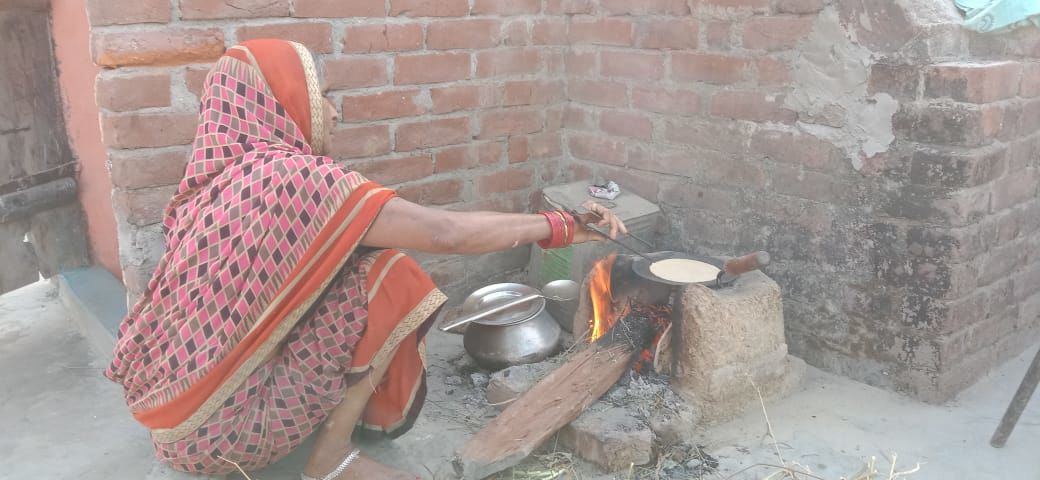
Falling demand for refills
A survey by the Research Institute for Compassionate Economics in 2018 revealed that 85 per cent of the beneficiaries of the scheme in Rajasthan, Uttar Pradesh, Bihar and Madhya Pradesh were still using traditional wood stoves for cooking. The CAG report in 2019 stated that the rate of cylinder refill under Ujjwala Yojana is 3.21 cylinders per annum.
In 2020, the Federation of LPG Distributors in India claimed that since the launch of Ujjwala scheme, 22 per cent of the beneficiaries had not refilled their cylinders and 5-7 per cent had not received subsidy money even for their first refill.
After the COVID-19 lockdown was imposed in March 2020, the central government announced three free refills to Ujjwala Yojana beneficiaries between April and June 2020. As there are 80 million Ujjwala beneficiaries, a total of 240 million cylinders were to be refilled. However, only half that number (120 million) of cylinders were refilled by June.
In view of this, the government extended the duration by three more months but even by the end of September, only 140 million (60 per cent) cylinders were refilled. Thereafter, the deadline was further extended to March 31 this year, and the reports on that are awaited.
“The government sent money to the beneficiaries’ account for free gas refills for three months,” a dealer of a gas agency based in Suriyawan, Bhadohi in UP, on the condition of anonymity, told Gaon Connection. “People withdrew the money but did not refill their cylinders. With the same money, they bought the uple (dung cakes) and firewood,” the dealer said. “There are a total of seven thousand Ujjwala scheme connections from fifteen villages at my centre but for the last five months only three thousand to four thousand cylinders have been refilled,” he informed Gaon Connection.
With inputs from Sachin Tulsa Tripathi from Satna in Madhya Pradesh; Virendra Singh from Barabanki; and Sumit Yadav from Unnao in Uttar Pradesh.

